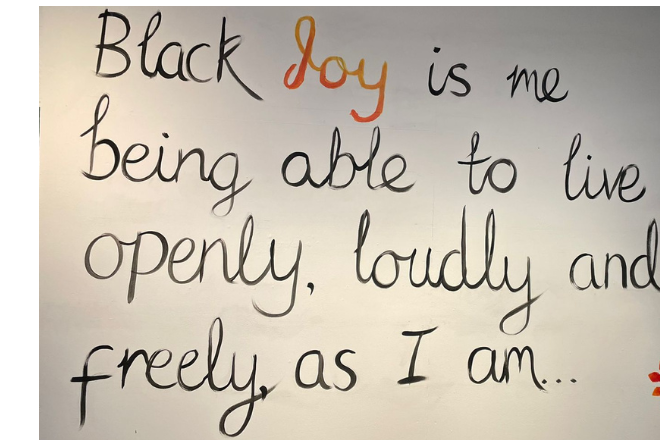As part of our commitment to inclusivity and diversity, we are publishing another blog in our series highlighting those who are excluded or under-served in healthcare and co-production. This month, we are focusing on the voices of trans people. Trans is an umbrella term to describe people whose gender is not the same as, or does not sit comfortably with, the sex they were assigned at birth.
"For me, visibility and safety go hand in hand and it might be up to trans people to be visible but it’s not up to us to be safe. We don’t determine how safe we are, it’s the other people, it’s the people who oppress us, it’s the people who target us, it’s the people who have power over us." — Sabah Choudrey interviewed on Kicking the Kyriarchy
Sabah Choudrey is a trans youth worker, co-director of the Colours Youth Network,, and co-founder of the first ever Trans Pride Brighton — a charity run solely by volunteers, aiming to inspire all trans, intersex, gender variant and queer people to help make a real difference by celebrating trans lives and gender diversity.
As a public speaker and educator, Sabah has developed an inclusivity guide based on the lived experience of BAME trans people. The appropriately titled Inclusivity was published by Gender Identity Research & Education Society and took an intersectional approach to understanding identities as complicated and layered.
For us as a Collective, it was particularly inspiring to read about ways to build trust in the BAME trans community and open a dialogue about how things can be different, as well as how we can listen to BAME trans people and let them take the lead. However, reading Inclusivity has also opened our eyes to systemic barriers that need to be removed before this process of building trust – let alone meaningful co-production - can even start.

Visible yet still excluded
‘There is a trans tidal wave crossing Britain, and we are seeing more trans people in the media making headlines more than ever, with the demand for support for trans people higher than ever.’ — Sabah Choudrey
Though there is a growing interest in trans "issues", there is less space for trans voices in the media. Stories published by UK media sources rarely, if ever, consult academics who specialize in trans studies. Trans academics and the wider trans community remain side-lined, silenced voices in these narratives that seek to define them as predatory figures (Transgender Studies Quarterly, 2020) or use them for an intellectual debate about gender.
Transgender activist Natalie Wynn explains that these commentaries deliberately downplay a very important human rights movement about the legal protection of transgender people and risk standing in the way of providing support and healthcare to an extremely vulnerable social group. They often actively deny their suffering by ignoring the evidence about the marginalisation of transgender and intersex groups (to name a few: 2018 Stonewall Report, 2019 survey by the EU Fundamental Rights Agency, 2020 Out of the Margins report). Despite decades of activism and countless stories shared about the trans lived experience, 2020 saw increasing restrictions on trans rights enacted in numerous countries including the UK.
In their ground-breaking study drawing from extensive quantitative and qualitative data, Williams and Tregidga examined how the impacts of hate crimes are experienced across seven different victim types. The study evidenced that victims of transgender hate crimes feel the impacts of victimization most, showing that the pattern seen in the United States, Canada, and Australia is replicated within the United Kingdom. Even more concerning were the findings of a study in 2020, showing that from a total of 155 transgender study participants, 151(97.42%) individuals reported experiencing sexual violence directly or indirectly at least once, with an average of 11.12 direct or indirect experiences of sexual violence.
Inclusivity relies on trust
There is very little research conducted about, let alone co-produced with, trans people. There is no global and updated data on the number of transgender persons (Sweileh 2018) and despite the increasing evidence of elevated mental health problems, self-harm, suicidality and substance use in transgender youth, little research has been undertaken comparing non-binary and binary transgender individuals (Rimeset al 2017).
There is a long way to go to build trust within the research and healthcare community. A study from 2020 identified that negative healthcare experiences of transgender individuals are often the result of a lack of transgender knowledge demonstrated by healthcare professionals. However, the study also highlighted that positive healthcare experiences did exist and were characterised by the use of inclusive language and the provision of an inclusive environment.
When writing blogs like these, we usually co-write with those with different forms of lived and learnt experience of the issues we are discussing. We contacted several trans individuals and groups to see if they would like to co-write this with us, but few have responded and those that did wanted to see us demonstrate a level of commitment towards true inclusivity and diversity before they could share their stories with us. Considering their ongoing mistreatment, exclusion and the systematic barriers they face every day, it is entirely understandable that they didn’t feel comfortable to do so at this time.
We want the Co-Production Collective community to be one that is truly inclusive, where everyone feels able to be their true selves. We hope that by writing this blog we can raise awareness of the discrimination and marginalisation of a very diverse and complex group of individuals, and continue to challenge ourselves and our ways of working. There will be a follow up to this blog in May, exploring the topic from perspective of a researcher working in this field. If you’re reading this and think you’d like to contribute your own experiences, then we would love to hear from you too – please get in touch.





.png)

.png)
.png)


.png)
.png)
.png)